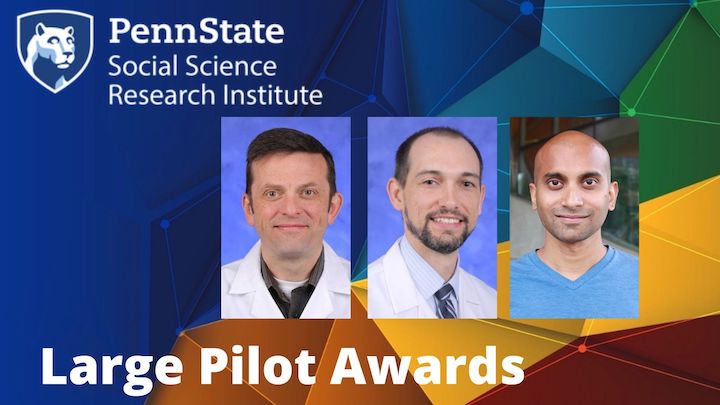
Three Penn State research teams were recently awarded Social Science Research Institute (SSRI) pilot funding to foster interdisciplinary research that addresses human and social problems.
The large pilot awards enable the development of new collaborations to pursue novel and high impact research in preparation of securing extramural funding. Funded projects focus on education, health, or economic disparities, inform policy and systems development to address these disparities, and emphasize the engagement of communities and other stakeholders. This year, three large pilot awards were announced:
"Developing an automated system to counter health misinformation in electronic media preferred by persons who identify as Black or African American" — Principal Investigator Dr. Robert Lennon, associate professor of community and family medicine; and co-principal investigators Christopher Griffin, research professor, Applied Research Laboratory; Robbie Fraleigh, assistant research professor, Applied Biological & Biosecurity Research Lab; Ray Block, associate professor of political science and African American studies; and Lijiang Shen, professor of communication arts and sciences.
COVID-19 has highlighted health disparities, with African Americans suffering the highest death rate of any racial group in the US. Research has shown that COVID 19 misinformation can lead to health knowledge gaps, and identifying misinformation is the first step to countering it. This project will adapt previously developed Artificial Intelligence applications to analyze Twitter® feeds and free text data about COVID 19. Pilot data generated will support external funding to refine this approach and explore how effective counter information is at reducing knowledge gaps.
"Towards Sustainable Rural Health Care Delivery: A Pilot Study to Explore Preventive Health Care Access Using a Mobile Health Clinic" — Principal Investigator Dr. Michael McShane, assistant professor of medicine; and co-principal investigators Kristina Brant, assistant professor of rural sociology; Danielle Rhubart, assistant professor of biobehavioral health; Joel Segel, associate professor of health policy administration; Lisa Davis, director, Pennsylvania Office of Rural Health; and Dr. Mark Stephens, professor of family and community medicine.
Residents of rural America face unique barriers to accessing and utilizing health care services, while the current model for rural health care is increasingly financially and socially unsustainable. Using a teaching Mobile Health Clinic (MHC) and community-engaged research methods, the research team will investigate preventive health care delivery to medically underserved rural communities in Central Pennsylvania through the lens of sustainability. Data analysis will uncover the health-related needs and opportunities of residents and explore whether and how the MHC model can be tailored to equitably increase access to care. Additionally, this pilot study will establish the infrastructure needed to design, implement, and evaluate further interventions in medically underserved rural communities.
"Financial wellbeing for individuals living with mental illnesses: Toward a privacy-preserving and data-driven intervention platform" — Principal Investigator Saeed Abdullah, assistant professor of information sciences and technology; and co-principal investigators Dahlia Mukherjee, assistant professor of psychology and behavioral health; and Dr. Erika Saunders, Gerald B. Shively and Robert Y. Tan Professor.
Financial stability is a key challenge for individuals with mental illnesses. Symptomatic periods often manifest in poor financial decision making, which can drastically reduce recovery rate as well as negatively impact stability and quality of life in the long term. The research team’s goal is to address this gap by leveraging objective financial data in a privacy preserving manner to develop granular assessment and intervention methods. The project will focus on establishing a preliminary evidence base using data to conduct mixed-method studies to establish design and privacy requirements as well as develop high-fidelity prototypes to assess acceptance and feasibility.
About SSRI
SSRI is one of seven interdisciplinary research institutes at Penn State that connects interdisciplinary teams of researchers that addresses critical human and social challenges at the local, national, and international levels. The institute supports 58 cofunded faculty positioned within nine colleges and over 500 faculty across nine campuses via various funding mechanisms.